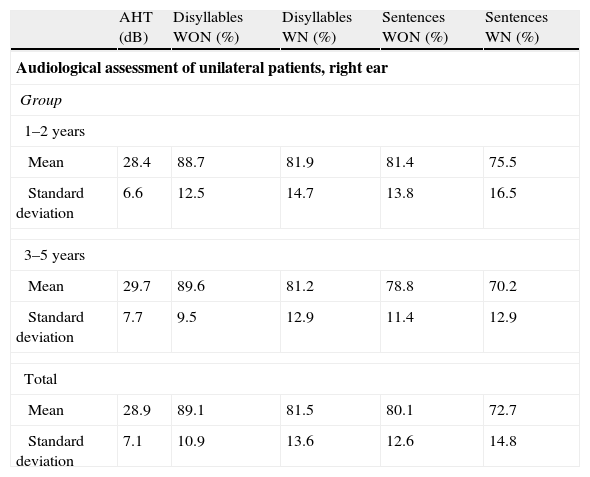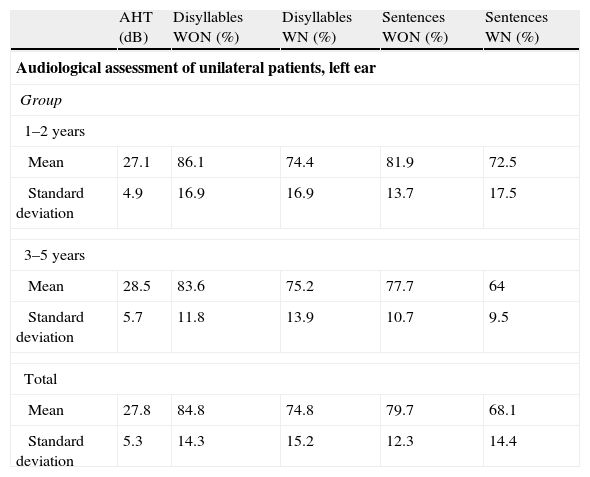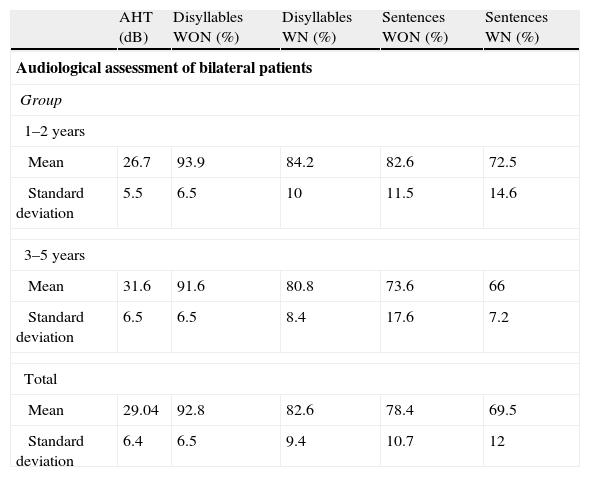Some studies suggest that simultaneous or sequential cochlear implantation in a short period of time offers additional benefits. There is a controversy regarding the existence of an age limit after which a second implantation offers less benefit for the acquisition of communication skills. The objectives of this study were to confirm that sequential cochlear implantation offers benefits compared to unilateral implantation and to study whether, at 12 years of age, there are significant differences regarding the age at the time of the second implantation.
MethodsDescriptive and observational study of a population of 12-year-old children carrying cochlear implants (n=69). A liminal pure tone audiometry and an open-field verbal discrimination test (disyllables, common phrases in an open context, with and without noise) were conducted to evaluate audiological benefits.
ResultsVerbal discrimination results were better among patients who had been implanted before the age of 2 years, although the differences were not statistically significant (P>.5). Children who had received bilateral cochlear implants before the age of 2 years and with a period less than 4 years between both implants presented better verbal discrimination percentages (P<.05).
ConclusionsIn our sample, early cochlear implantation with a short period between both implants provided significant benefits regarding intelligibility. There seem to be a specific age and interimplant period, after which the auditory benefit on the first implant becomes reduced.
Algunos estudios sugieren que la implantación coclear (IC) simultánea o secuencial en un corto periodo de tiempo aporta beneficios adicionales. Existe controversia acerca de la existencia de una edad límite a partir de la cual la segunda implantación aporta un beneficio menor en la adquisición de habilidades comunicativas. Los objetivos de nuestro estudio consisten en corroborar que la implantación coclear secuencial aporta beneficios sobre la unilateral, y estudiar si existen a los 12 años diferencias significativas según la edad en el momento de la segunda implantación.
MétodosSe trata de un estudio observacional descriptivo sobre una población de 12 años portadores de implante coclear (n=69). Para evaluar los beneficios audiológicos se llevó a cabo una audiometría tonal liminar y un test de discriminación verbal a campo libre (bisílabos, frases cotidianas en contexto abierto, con y sin ruido).
ResultadosLos resultados en términos de discriminación verbal fueron mejores en los pacientes implantados antes de los 2 años de edad, sin embargo no existen diferencias estadísticamente significativas (p>0,5). Los usuarios de IC bilateral implantados antes de los 2 años y con un periodo entre interimplante inferior a 4 años muestran mejores porcentajes de discriminación verbal (p<0,05).
ConclusionesLa implantación coclear precoz y con un corto periodo interimplante demuestra en nuestra muestra proveer a los pacientes beneficios significativos en términos de inteligibilidad. Parece haber una edad y un periodo interimplante concreto a partir de la cual se reduce el beneficio auditivo sobre el primer implante.
Artículo
Comprando el artículo el PDF del mismo podrá ser descargado
Precio 19,34 €
Comprar ahora











